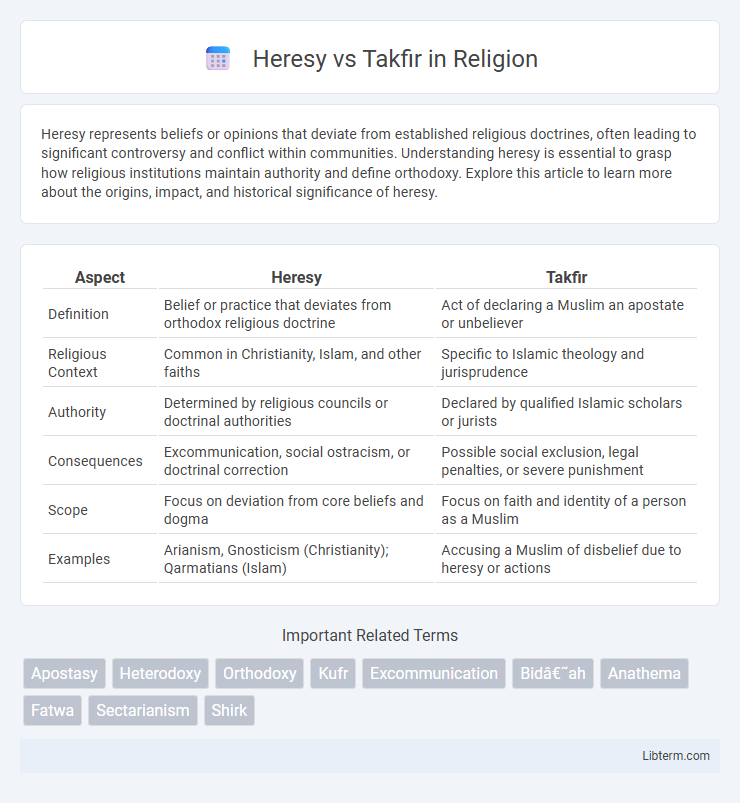Heresy represents beliefs or opinions that deviate from established religious doctrines, often leading to significant controversy and conflict within communities. Understanding heresy is essential to grasp how religious institutions maintain authority and define orthodoxy. Explore this article to learn more about the origins, impact, and historical significance of heresy.
Table of Comparison
| Aspect | Heresy | Takfir |
|---|---|---|
| Definition | Belief or practice that deviates from orthodox religious doctrine | Act of declaring a Muslim an apostate or unbeliever |
| Religious Context | Common in Christianity, Islam, and other faiths | Specific to Islamic theology and jurisprudence |
| Authority | Determined by religious councils or doctrinal authorities | Declared by qualified Islamic scholars or jurists |
| Consequences | Excommunication, social ostracism, or doctrinal correction | Possible social exclusion, legal penalties, or severe punishment |
| Scope | Focus on deviation from core beliefs and dogma | Focus on faith and identity of a person as a Muslim |
| Examples | Arianism, Gnosticism (Christianity); Qarmatians (Islam) | Accusing a Muslim of disbelief due to heresy or actions |
Understanding Heresy in Religious Contexts
Heresy involves the deviation from established religious doctrines, often challenging foundational beliefs and leading to doctrinal disputes within faith communities. It is generally characterized by teachings or opinions that contradict the orthodox interpretations upheld by the majority of believers, resulting in social and theological consequences. Understanding heresy in religious contexts requires examining historical definitions, ecclesiastical responses, and the impact on community coherence and identity.
Defining Takfir: Origins and Usage
Takfir, originating from the Arabic root k-f-r meaning "to cover or deny," refers to the act of declaring a Muslim apostate or non-believer, often leading to severe religious and social consequences. Unlike general accusations of heresy, which encompass a broad range of doctrinal errors, Takfir specifically involves excommunication within Islamic jurisprudence, primarily used by certain extremist groups to justify violence against those deemed outside true Islam. Historical usage of Takfir dates back to early Islamic schisms, but its modern application often serves as a tool for ideological control and sectarian conflict in contemporary Muslim societies.
Historical Development of Heresy and Takfir
Heresy and takfir have distinct historical developments rooted in religious contexts, where heresy traditionally refers to beliefs or practices diverging from orthodox doctrines, particularly within Christianity since the early councils of Nicaea and Chalcedon. Takfir emerged in Islamic history as the act of declaring a Muslim an unbeliever, gaining prominence during the early Islamic sectarian conflicts and later intensifying with movements like the Kharijites in the 7th century. Both concepts evolved as mechanisms to define community boundaries and establish theological authority, shaping religious identity and political power throughout history.
Key Differences Between Heresy and Takfir
Heresy refers to beliefs or practices that deviate from established religious doctrines, often within a given faith tradition, while takfir is the act of declaring a Muslim as an unbeliever or apostate. The key difference lies in scope: heresy addresses doctrinal errors broadly, whereas takfir specifically involves pronouncing someone outside the fold of Islam. Takfir carries significant social and legal implications, frequently leading to exclusion or punishment, which is not inherently the case with heresy.
Theological Implications of Heresy
Heresy in Islamic theology refers to beliefs or practices that deviate from the core doctrines of Islam, potentially leading to spiritual misguidance and doctrinal corruption. The theological implications of heresy involve the compromise of faith integrity, threatening communal unity and the continuity of true Islamic knowledge. Unlike takfir, which is the act of declaring someone an unbeliever, heresy focuses on erroneous beliefs within the Muslim community that require correction and theological scrutiny.
Takfir in Islamic Jurisprudence
Takfir in Islamic jurisprudence refers to the practice of declaring a Muslim an unbeliever (kafir) based on their beliefs or actions that are deemed to violate fundamental Islamic tenets. This concept is more severe than heresy, which generally implies a deviation from orthodox beliefs without formal excommunication. Takfir carries significant legal and social consequences, often involving apostasy laws and impacting communal cohesion within the Muslim ummah.
Social and Political Impact of Takfir Accusations
Takfir accusations significantly disrupt social cohesion by fostering distrust and sectarian divisions within Muslim communities, often leading to violence and ostracism of accused individuals or groups. Politically, Takfir is exploited by extremist factions and authoritarian regimes to delegitimize opponents, justify repression, and consolidate power through fear and ideological control. These dynamics exacerbate instability, hinder dialogue, and undermine efforts toward inclusive governance and communal harmony.
Heresy and Sectarian Divides
Heresy refers to beliefs or opinions that deviate from established religious doctrines, often causing deep sectarian divides within communities. This deviation fuels conflicts by challenging orthodox interpretations and undermining religious unity, which contributes to fragmentation among sects. Understanding heresy is crucial for analyzing how sectarian tensions arise and perpetuate divisions between different religious groups.
Controversies and Modern Debates
Heresy and Takfir remain central controversies within Islamic theology, sparking intense debates over the legitimacy of declaring someone an apostate or unbeliever. Modern discussions emphasize the risks of Takfir misuse, which can fuel sectarian violence and political extremism, challenging efforts to promote religious tolerance and unity. Scholars increasingly advocate for nuanced interpretations to prevent sectarian divisions while maintaining doctrinal integrity.
Promoting Tolerance: Avoiding Unwarranted Excommunication
Heresy refers to beliefs or opinions that deviate from established religious doctrines, while takfir is the act of declaring a Muslim an unbeliever or apostate, often leading to social and legal consequences. Promoting tolerance within Islamic communities involves cautious theological interpretation to prevent unwarranted excommunication that can cause divisiveness and conflict. Emphasizing dialogue, knowledge, and compassion helps maintain unity and respects diverse interpretations without compromising core faith principles.
Heresy Infographic

 libterm.com
libterm.com